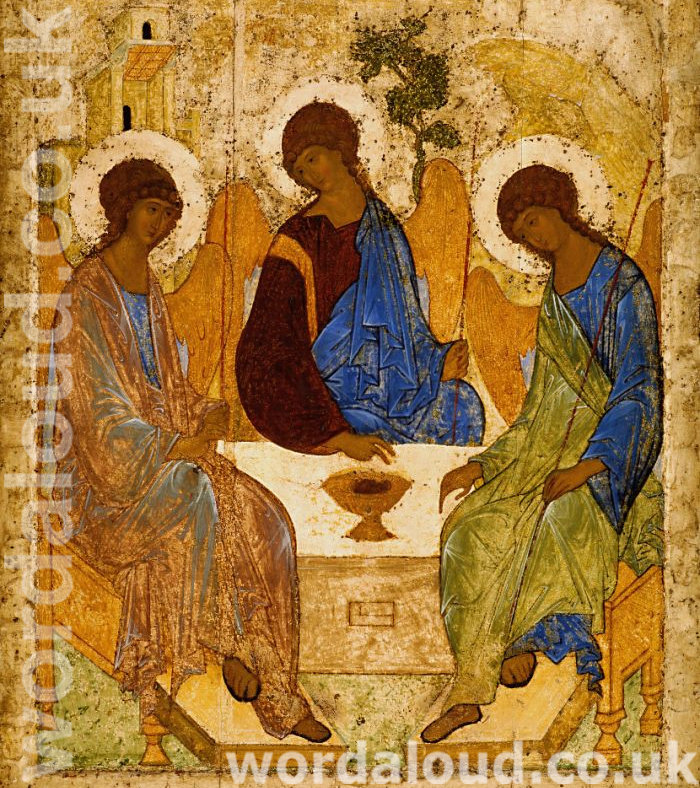Christian Art | Iconography Of The Blessed Trinity | The Old Testament
Office Of Readings | Week 31, Thursday, Ordinary Time | A Reading From The Instructions Of Saint Cyril Of Jerusalem To Catechumens | On The Creed
‘On the creed.’
Saint Cyril of Jerusalem sets out the function and authority of the Creed within Christian teaching. His concern is to ensure the integrity of the faith as it is received, memorised and lived by the baptised. The Creed, for Cyril, is not a private reflection or personal interpretation but the concentrated form of the Church’s collective witness, drawn from Scripture and confirmed by tradition.
Cyril begins by grounding the Creed in Scripture and apostolic tradition. Since not all believers can study or read Scripture directly, the Church provides a concise summary that contains ‘the whole of the faith in a few concise articles’. The Creed thus serves as a safeguard against ignorance, a means of preserving the essentials of belief for all, irrespective of learning or circumstance. It is a pedagogical and pastoral tool: a synthesis of doctrine accessible to memory yet rooted in the full depth of revelation.
He insists that this Creed must be retained without alteration. His warning against any innovation — whether from a teacher, a supposed angel, or even himself — echoes Saint Paul’s admonition to the Galatians: the faith once delivered is not subject to revision. This insistence reflects the fourth-century context, in which heresy and controversy over the nature of Christ had divided the Church. The Creed, then, functions as a boundary of orthodoxy and a measure of truth, protecting believers from distortion.
Cyril likens the Creed to a mustard seed — small in form yet containing within itself the entirety of divine truth. The image expresses both compression and potentiality: the Creed is brief but generative, unfolding through contemplation into a fuller understanding of God’s work. He compares it also to a deposit entrusted to the believer, which must be kept intact and offered back to God at the end of life. Faith is therefore not static possession but a responsibility; what is received in trust must be preserved through vigilance and obedience.
The closing section connects this act of fidelity with eschatological accountability. The believer will one day render an account of the treasure entrusted by God. The Creed, memorised and held in the heart, becomes both a confession of faith and a preparation for judgment. It binds the believer to Christ, ‘the blessed and sole Ruler’, whose glory surpasses sight and knowledge.
Cyril’s teaching frames the Creed as a living summary of revelation: derived from Scripture, authorised by tradition, safeguarded in memory, and fulfilled in the final vision of God.

A Reading From The Instructions Of Saint Cyril Of Jerusalem To Catechumens | On The Creed
In learning and professing the faith, you must accept and retain only the Church’s present tradition, confirmed as it is by the Scriptures. Although not everyone is able to read the Scriptures, some because they have never learned to read, others because their daily activities keep them from such study, still so that their souls will not be lost through ignorance, we have gathered together the whole of the faith in a few concise articles.
Now I order you to retain this creed for your nourishment through life and never to accept any alternative, not even if I myself were to change and say something contrary to what I am now teaching, not even if some angel of contradiction, changed into an angel of light, tried to lead you astray. For even if we, or an angel from heaven, should preach to you a gospel contrary to that which you have now received, let him be accursed in your sight.
So for the present be content to listen to the simple words of the creed and to memorize them; at some suitable time you can find the proof of each article in the Scriptures. This summary of the faith was not composed at man’s whim; the most important sections were chosen from the whole Scripture to constitute and complete a comprehensive statement of the faith. Just as the mustard seed contains in a small grain many branches, so this brief statement of the faith keeps in its heart, as it were, all the religious truth to be found in Old and New Testament alike. That is why, my brothers, you must consider and preserve the traditions you are now receiving. Inscribe them across your heart.
Observe them scrupulously, so that no enemy may rob any of you in an idle and heedless moment; let no heretic deprive you of what has been given to you. Faith is rather like depositing in a bank the money entrusted to you, and God will surely demand an account of what you have deposited. In the words of the Apostle: I charge you before the God who gives life to all things, and before Christ who bore witness under Pontius Pilate in a splendid declaration, to keep unblemished this faith you have received, until the coming of our Lord Jesus Christ.
You have now been given life’s great treasure; when he comes, the Lord will ask for what he has entrusted to you. At the appointed time he will reveal himself, for he is the blessed and sole Ruler, King of kings, Lord of lords. He alone is immortal, dwelling in unapproachable light. No man has seen or ever can see him. To him be glory, honour and power forever and ever. Amen.
Christian Prayer With Jesus
God of truth and light,
you have entrusted to your Church the faith once delivered to the saints.
Grant that we may guard this treasure with integrity,
confess it with clarity,
and live by it with steadfast hearts.
Let your word, sealed in our memory and written on our hearts,
be our guide in trial and our strength in witness.
Keep us faithful to the confession of your Son,
until the day we behold him in the light unapproachable,
who lives and reigns with you and the Holy Spirit,
one God, forever and ever.
Amen.
Glossary Of Christian Terms
Creed: A formal statement of Christian belief summarising the essential doctrines of the faith, used in baptism and liturgy as a profession of unity.
Tradition: The living transmission of the faith through the teaching, worship, and life of the Church, distinct from but inseparable from Scripture.
Orthodoxy: Right belief; adherence to the authentic teaching of the Church as opposed to heresy or deviation.
Heresy: A teaching or opinion that contradicts the defined doctrines of the Church.
Symbolum: The Latin term for ‘Creed,’ derived from the Greek symbolon, meaning a token or sign of recognition — a summary of faith identifying the believer.
Catechesis: Instruction in the faith given to those preparing for baptism or to the faithful seeking deeper understanding.
Eschatology: The study or doctrine of the ‘last things’ — death, judgment, heaven, and hell.
Deposit of Faith: The totality of revelation entrusted by Christ to the apostles and transmitted through Scripture and tradition.
Apostolic Tradition: The continuity of teaching and faith passed from the apostles through their successors in the Church.
Mustard Seed (Metaphor): A biblical image signifying the potential and vitality of faith, small in appearance but vast in effect.








